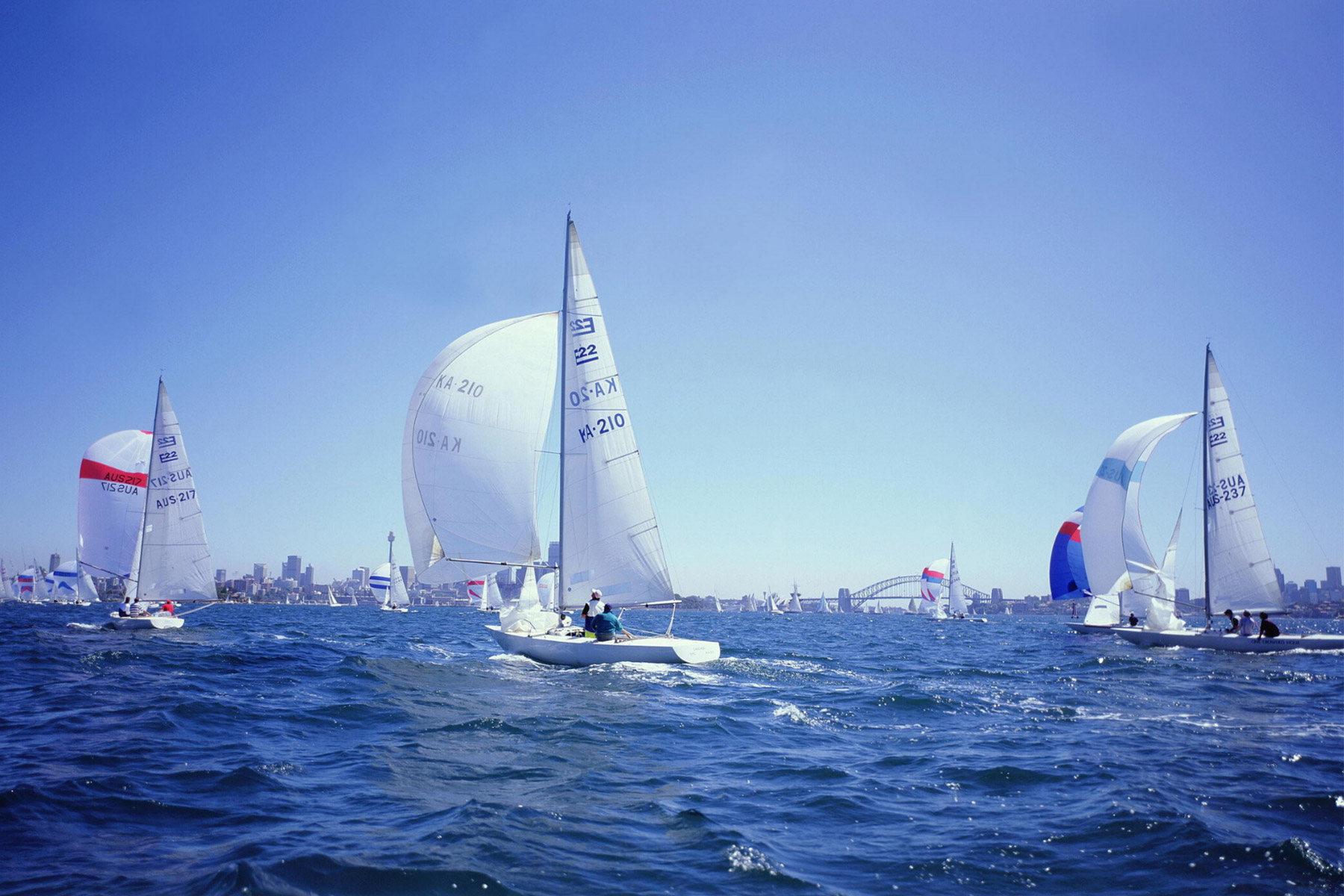
Early Specialization Sailing: Akin To Winning The Race When You Are OCS
I bet you’ve reminisced about your youth sailing days: visiting venues for the first time, the lessons learned, and the sailors that were consistently on the podium. Not too long ago, I thought the 15 year old winning Orange Bowl or the 13 year old that qualified for the Opti National Team would be our next Volvo (The Ocean Race), America’s Cup, or Olympic Medalist. But then I started thinking: where are those legendary sailors from my youth? Interestingly, many of them peaked in their late teens, entering their quick decline in the college years and, ultimately, leaving the sport almost all together. Why did these sailors with such promising trajectories in their youth, not pursue higher levels of competition in sailing?
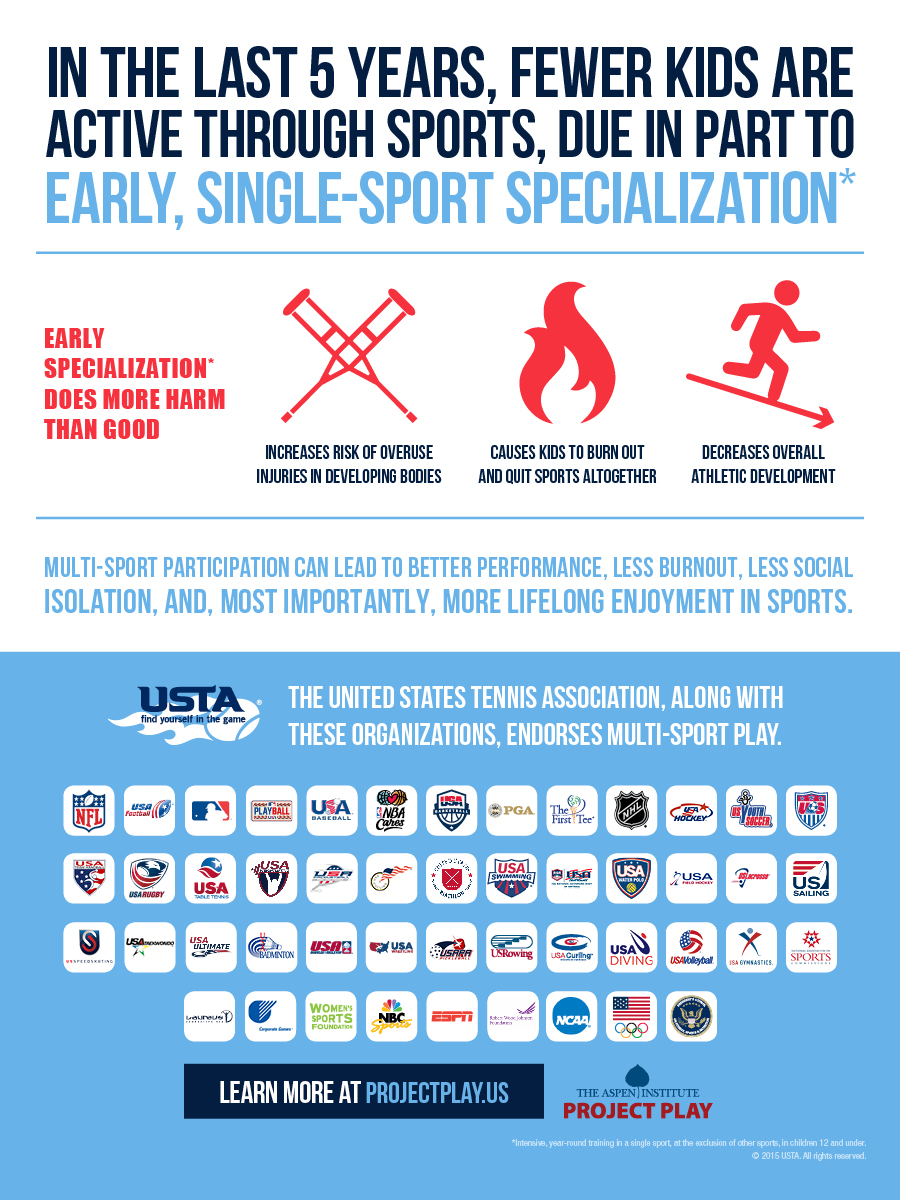
Keeping sailors engaged in the pipeline of our sport has been a long standing topic of concern but one that is not unique to our sport. In fact, the United States Olympic Committee is concerned about sport development and participation in the United States. All sports are seeing a decline in participation and early specialization is one of the most significant factors (USOC Meeting Colorado Springs, November 2018).
First, let’s start with the definition of sport specialization: intense training in one sport while excluding others. Early sport specialization includes this intense training in one sport at an adolescent age. There is no doubt, that athletes must practice their sport to become proficient, however, the intensity and singularity to which young athletes focus their training can have short and long term negative effects (Jayanthi et. al).
Advantages of Early Sport Specialization:
- Immediate performance improvements
Disadvantages of Early Sport Specialization:
- Burnout in late teen years
- Psychological fatigue from intense travel and competition
- Cost to overall athletic development
- Increase of injury due to systemic, repeated stress to same muscles and tendons used in one sport and a lack of development of other
- Decrease in long term sport success (Moesch et. al)
- Not cost-effective
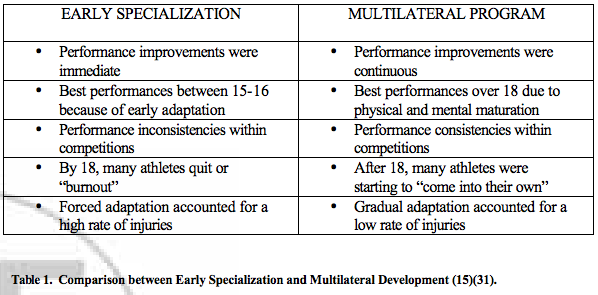
An excerpt from T.O Bompa, “Total Training for Young Children,” 2000 contrasting traits found in athletes that specialize too early versus athletes that are non-specialized or multilateral.
Sailing is a late-development sport–most sailing athletes reach their career peaks in their late twenties with many athletes reaching technically skilled positions well into their late thirties. For you parents and athletes out there, breathe a sigh of relief! Recognize the timeline that you have and the journey required to excel in this sport. Your results are not direct indicators of your potential lifetime achievements in sailing.
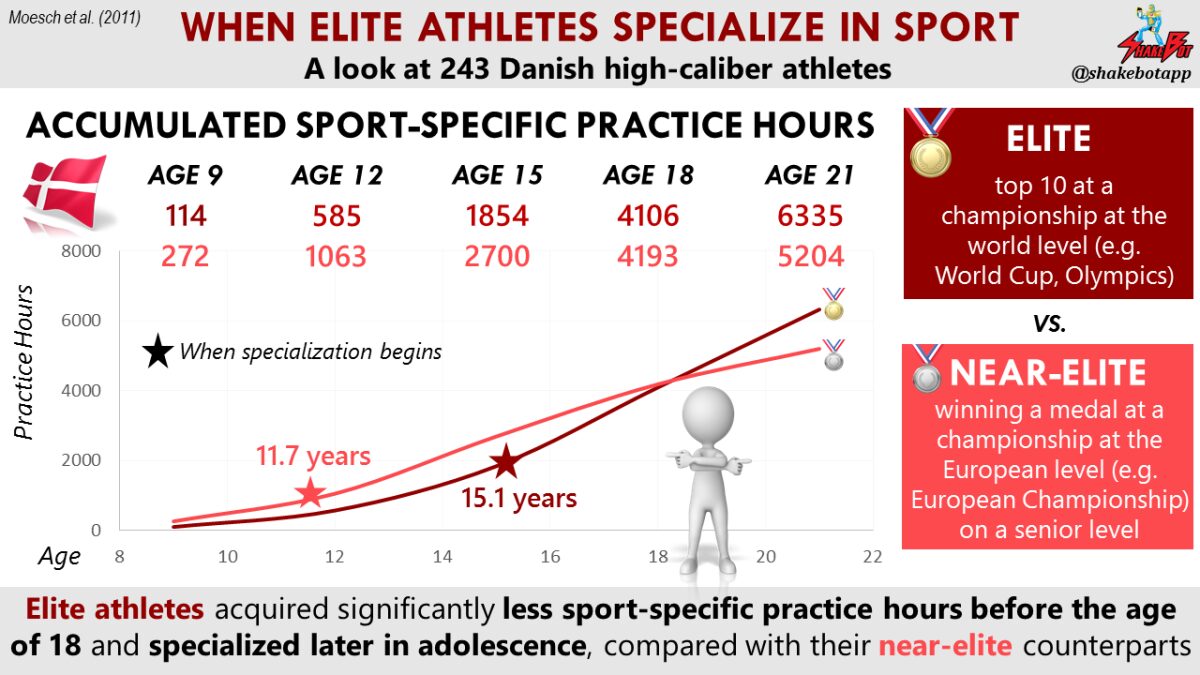
(Moesch, Elbe, Hauge, Wikman, “Late Specialization: The Key To Success In Centimeters, Grams, Or Seconds (CGS) Sports,” 2011)
There are, however, key indicators for long term success: physical literacy, cognitive literacy, nutritional literacy, social skills, just to name a few. In terms of factors that contribute to sport performance, sport-specific training accounts for only 28%! There are a myriad of skill-sets that every athlete must learn and perfect to succeed.

(Macnamara et al. (2014). “Deliberate Practice And Performance In Music, Games, Sports, Education, And Professions: A Meta-Analysis.”)
How To Take Control Of Your Sport Experience And Succeed:
- Don’t encourage or support early specialization! Have an off season to pursue other sports or interests, sail multiple classes, encourage play during sport.
- Develop and encourage physical literacy. Movement screens and fitness tests can help identify asymmetries in athleticism and signs of early specialization.
- Choose quality of competition over quantity. Choose to sail a few quality events each year (around 6) and focus on player development in between. Travel will cause burnout and repetitive gameplay will not give athletes the ability to focus on skill-development.
- Don’t focus sport as a means to college. This can easily disengage an athlete from personal development and intrinsic motivation. There will be opportunities for sailors to showcase their abilities. Focus on developing sailors as complete athletes (Eight Must-Have Physical Attributes for a College-Bound Athlete) and engender an intrinsic love for the sport. Do this and the sailor will put in the time to succeed.
- Model Good Behavior. Encourage fair play, reward process-oriented goals and not performance-oriented goals, and, above all, champion sportsmanship.
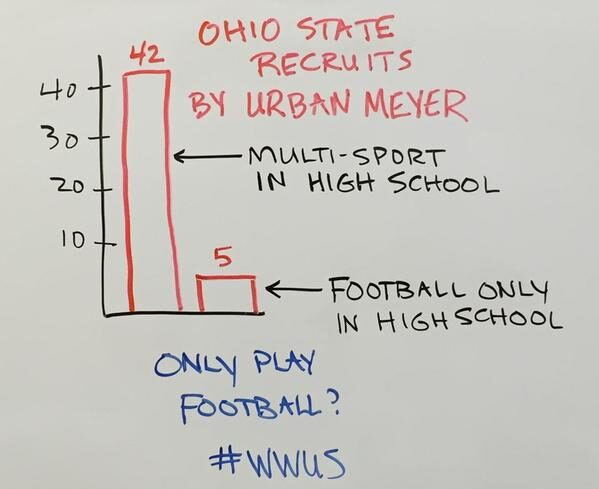
Multi-sport athletes are invaluable across all sports.
How Sailing Performance Training Can Help
- Don’t encourage or support early specialization! Have an off season to pursue other sports or interests, sail multiple classes, encourage play during sport. SPT is focused on long term athlete development. Our priority is to give athletes access to the advanced tools and expert coaches that will provide a safe and pleasant sport experience all at affordable prices!
- Develop and encourage physical literacy. Movement screens and fitness tests can help identify asymmetries in athleticism and signs of early specialization. One of SPT’s main focuses is on physical literacy and early specialization prevention. We have affordable, effective, and fun fitness plans that encourage engagement through appropriate and safe physical programming. Our Medallion Program is just $75/month! Learn more by clicking here.
- Choose quality of competition over quantity. Choose to sail a few quality events each year (around 6) and focus on player development in between. Travel will cause burnout and repetitive gameplay will not give athletes the ability to focus on skill-development. SPT is focused on long term athletic development. We build out multi-year periodization plans that educate the athlete on the path ahead and engage the athlete in their development. With a multi-year, long term plan, we can help prioritize the correct ratio of training v competition saving you time and money!
- Don’t focus sport as a means to college. This can easily disengage an athlete from personal development and intrinsic motivation. There will be opportunities for sailors to showcase their abilities. Focus on developing sailors as complete athletes (Eight Must-Have Physical Attributes for a College-Bound Athlete) and engender an intrinsic love for the sport. Do this and the sailor will put in the time to succeed. SPT Coaches are not only experts in their fields, but also sailors. We are knowledgeable of the sailing industry because we are #sailingathletes too! As coaches, we can provide the knowledge and expertise to give you confidence in when to peak for your important event, when the time is right, and help guide athletes through the many facets of sailing including college sailing!
- Model Good Behavior. Encourage fair play, reward process oriented goals and not performance oriented goals, and, above all, champion sportsmanship. Our goal is for every athlete to have a lifetime of enjoy in sailing! Check out our website to understand our core values and what we stand for.


